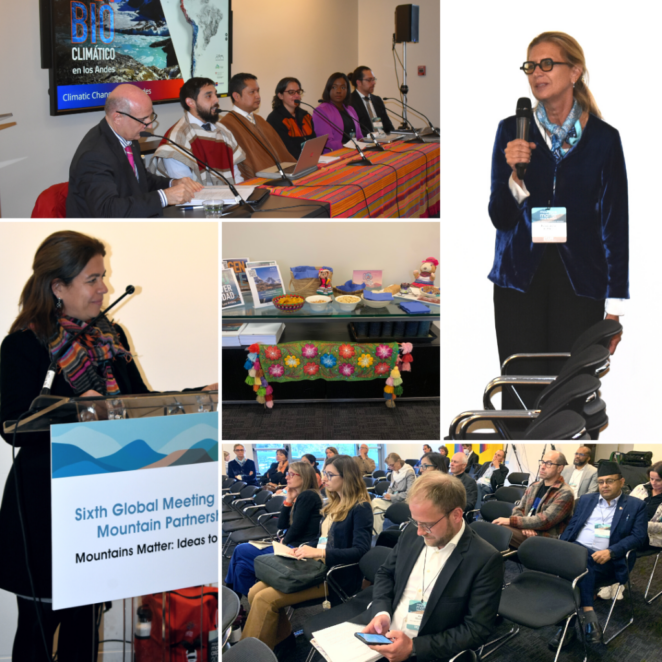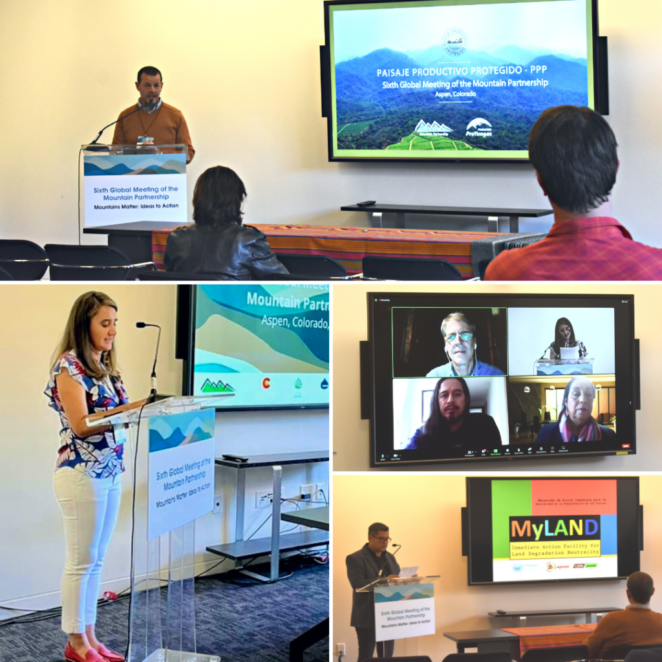Sixth Global Meeting of Mountain Partnership: South America and the Andes participate as an active block

Introduction
Every four years, Mountain Partnership holds a global gathering of its members, coming from several mountain regions and countries around the world. Between September 27 and 29, 2022, the Sixth Meeting was held in Aspen, Colorado (USA), co-organized by the Mountain Partnership, the Colorado State, the municipality of Aspen, the International Mountain Foundation of Aspen and the Aspen Institute.
Both the Andean Mountain Initiative (AMI) and a representation of the Mountain Partnership’s Group of South American Organizations attended the meeting with coordinated agendas for each case and held two parallel side events in order to show the progress and experiences of their respective groups. CONDESAN, through the Adaptation at Altitude – Andes Program, organized and moderated these events.
Strengthening of the Andean Mountain Initiative: Governance for resilient societies in the region
“I have been a witness to this process from the beginning, 15 years ago. I want to congratulate you on how far you have come, especially in this last period” –Rosalaura Romeo – Mountain Partnership Secretariat
This side event was aimed at showing regional information collected for the sustainable management of mountains in the region. It shared the governance experience of the Andean Mountain Initiative, including planning and decision-making processes, and demonstrated the value of interregional exchange processes. The Andean region was presented as one of the most important regions in terms of biodiversity on the planet, but at the same time as among the most vulnerable due to its socio-economical and biophysical characteristics, and highly impacted by climate change. The seven countries of the region have come together to face these challenges in increasingly concrete ways, and are also working to learn about and replicate, through exchanges with other mountain areas, the best practices worldwide.

GENERATION AND MANAGEMENT OF KNOWLEDGE AND STRATEGIC ASSOCIATION FOR THE SUSTAINABLE DEVELOPMENT OF MOUNTAINS IN SOUTH AMERICA
In the context of the diversity of existing mountain socio-ecosystems and landscapes, it is key to promote diverse, local and comprehensive approaches, informed by relevant knowledge and supported by strategic alliances. Within the framework of the event, a diversity of experienceswere presented to promote dialogue between institutions and actors and collaborative and inclusive co-construction, incorporating various voices and visions to the ancestral discussion of the region. Throughout the event, the attending South American organizations showed their work with different approaches and on various proposals for sustainable development in the region’s mountain areas; from the generation and management of relevant, timely and profitable knowledge to the implementation of Sustainable Land Management strategies at the landscape level, working with the local population to rescue local knowledge and find more sustainable ways of life. Much effort has also been put into capacity building, peer exchange, South-South cooperation and making mountains visible, to influence policies and achieve more favorable conditions. Workis alsobeing done to strengthen ties with other mountainous regions of the world, to form a global coalition that aims to work even more for the well-being of its ecosystems and inhabitants.

Outcomes and Impacts
Outcomes and impacts of the Strengthening of the Andean Mountain Initiative side event
During the side event, participants explored the possibility of collaborating with UNESCO regarding the biosphere reserves in the Andes and implementing an adaptation fund. The possibility of establishing a peer-to-peer exchange with the Alpine Convention Collaboration was discussed and ties with UNEP were strengthened. In addition, three organisations manifested their interest to be more active in the discussions of the group: Mujeres a la Cumbre, HimalAndes y el Instituto de Montaña de Perú.Outcomes and impacts of the Sixth Global Meeting of the Mountain Partnership
THE OFFICIAL SESSIONS OF THE MOUNTAIN PARTNERSHIP AND RESULTS
The Mountain Partnership held several official sessions, during which a series of strategic documents were presented for review and endorsement by members; the Promotion Strategy and the Communication Strategy were approved.
The Governance Document underwent a series of substantial revisions. It was agreed to add some key points in the definition of the Mountain Partnership’s Vision: references to climate change, loss of biodiversity and ecosystem restoration, and the well-being of the population. Second, the creation of a scientific advisory body was proposed, an initiative widely welcomed by delegates. Aspects such as the redefinition of the functions of the president of the Steering Committee and the hosting agreement of the Mountain Partnership by the FAO were also discussed.
A new Steering Committee was then elected, with votes to elect representatives from each of the regions. For South America, Peru was chosen as government representative, with Argentina as alternate representative. The Center for High Mountain Studies (CEAM) replaces CONDESAN as group representative, with Crescente Fértil as alternate.
The Aspen Declaration
A key outcome of the meeting was the approval by delegates of the Aspen Declaration. It establishes the key role that mountain ecosystems play in providing essential goods and services, as well as being home to more than a billion people, while highlighting the vulnerability of mountain ecosystems and the need to find ways to protect them. Also highlighted is the work of the Mountain Partnership and its relationship with other relevant international processes, such as the United Nations Framework Convention on Climate Change, the Convention on Biological Diversity, the United Nations Convention to Combat Desertification and work related to the Sustainable Development Goals. The Declaration promotes work that brings the mountains agenda increasingly to the center of these processes. It also proposes to include among the UN General Assembly resolution on the International Year for Sustainable Mountain Development a proclamation of the period 2023-2027 as “the five years of action for the development of mountain regions”. In the Declaration, the members of the Mountain Partnership express their commitment to these initiatives and request the support of the Mountain Partnership for their achievement.
- 6th Global Meeting of the Mountain Partnership: Summary report, 27–29 September 2022
- Sixth Global Meeting of The Mountain Partnership: Tackling the Climate Crisis at Altitude by Fostering a Community of Practice
- Global Meeting provides new momentum for mountains
- IPCC Special Report on Ocean and Cryosphere - High Mountain Areas
- Tanks, tunnels and determination - how rainwater harvesting and greenhouses lift smallholder resilience in the Colombian Andes
- Global Observation Research Initiative in Alpine Environments (GLORIA) - Andes Network

Comments
There is no content